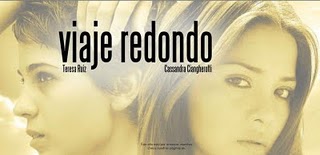
VIAJE REDONDO (ROUND TRIP)
Mexico, 2009, 95 minutes, Colour.
Cassandra Ciangherotti, Teresa Ruiz.
Directed by Gerardo Tort.
Round Trip is set in Acapulco and in the Mexican countryside in 1990. It focuses on two young women, one rich, one poor, and their escaping from their homes, their mothers and their responsibilities, in order to find boyfriends who may or may not be still interested in them.
Teresa Ruiz portrays a poor young woman, a hairdresser, with a young baby. She sets out to find the father who is working in Houston. The other is Fernanda, a rich and capricious young woman who is looking for her boyfriend whom she encouraged to play the field but whom she wants to link up with.
The film has them meet by accident at a service station, Fernanda giving Lucia a lift. As they travel, they talk, tell their stories (with some lies) and become friends. They are stranded, helped by villagers in a small town, go to a bigger town and enjoy dancing at the bar. Finally, there is a long sequence where the two of them talk, explore their bodies, draw tattoos, talk about identity and sexual relationships. Finally, they go on their way, Fernanda meeting her boyfriend who welcomes her and Lucia getting out of the bus on her return home to visit a young truck driver whom she had met on the way.
The film, while directed by a man, was written by women and has a very strong female, even feminine perspective.
1.A road movie, different? Mexico? The female perspective?
2.1990, Acapulco, the city, the salon, the people? The poor family, the rich family?
3.Travels in Mexico, bus, car, the highways, the service stations, the byroads, the tracks, villages, towns and bars, the countryside, the desert, the mountains?
4.The musical score, the songs?
5.The introduction to Lucia, doing hair, her co-worker, the customers, her decision to leave, her baby, discussions with her mother, leaving the baby? The contrast with Fernanda, rich, petulant, the counselling session, her lack of imagination to beat the cushion as a substitute for Mario? Clashing with her mother?
6.The service station incident, Fernanda losing her wallet, her anger, pushing, searching, Lucia and her treatment, Lucia missing the bus? The offer from the truck driver – and later meeting him? Fernanda returning and offering a lift?
7.The two girls talking, their age, experience, sharing stories, not telling the exact truth? The effect of having the brief flashbacks to illustrate each story? Fernanda and the boys, dancing? Lucia, the engagement, the sexual encounter, the baby? Their confiding in each other, the beginnings of friendship? The crash of the car? Blame? Lucia walking off? Fernanda sunning herself? The rescue?
8.The village, primitive, food, talking with the mother, feeding the baby? The slaughter of the goat? Fernanda’s reaction? Their wandering, lost in the desert, their rescue?
9.The town, going to the bar, dancing, Fernanda and her belly-dance, the Indian watching her, accosting her? Lucia dancing with the truck driver?
10.In the room, the long sequence, girls, in themselves, differences, women’s talk, learning how to dance, the painting of the breasts, the tattoos, naked, the kissing, self-consciousness, their each having a fantasy about their boyfriend? The effect, feeling?
11.The journey, at ease with each other, the final embrace, wondering whether they would see each other again?
12.Fernanda, meeting Mario, whispering to him, the happy ending?
13.Lucia and the bus, the sign for the town, getting out, the men working with the herds, the driver?
14.The mothers and their comments during the final credits?
15.Insight, feeling?